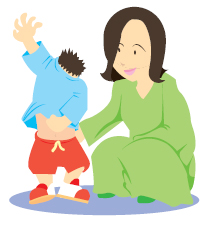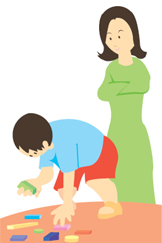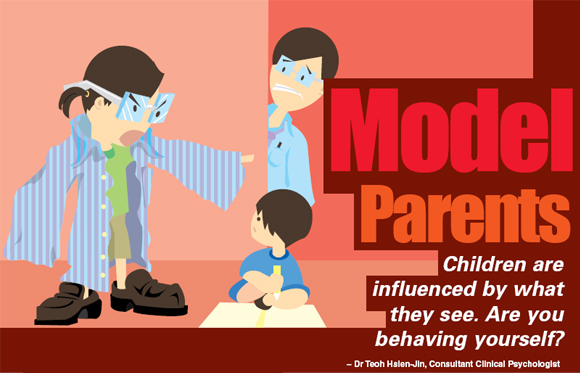Face it – each of us is raising a little ‘mini me’. He or she is a reflection of ourselves at our best (or worst, for that matter). There are a host of circumstantial reasons for this occuring.
First, as a parent, you hold the key to rewards and punishments for your child. It makes sense for them to want to please you by trying to do the things you do.
Second, by virtue of the fact that your children get to see and be with you often, it is inevitable that some of your behaviours and attitudes will ‘rub off’ on them over time.
Last, but not least, is the tendency for your children to actually want to be like you as a way of identifying more closely with the adult whom they love.

You probably already knew these things about your children. But do you underestimate the extent of your influence over them? Like it or not, your children will become like you in some ways. They will do this largely by learning from what you do, rather than what you say.You can hope all you want but commanding your children to “do as you say, not as you do” won’t do any bit of good in the long run.
Most of us would be daunted by the relentless attention of little eyes, ears and hearts that are constantly observing and learning from our every action and attitude. Your children can’t help it and neither can you. So, you’re left with only one course of action – to always be on your best behaviour so that they will be, too.
Self-Sufficiency
Self-sufficiency is about having the ability to recognise and respond independently to a need. Among many character traits, selfsufficiency is one that is greatly influenced by parental role modelling.
Take, for example, a child who feels cold. Part of being self-sufficient is to have learned that pulling a blanket over himself will make him feel more comfortable. The other part is deciding how to get the desired result. The child has three options:
- “I will let Mommy and Daddy decide what I need, and wait for them to provide it.” (Dependency)
- “I will tell Mommy and Daddy what I need. I will ask them for it.” (Influencing)
- “I will get it myself, or I will do it myself.” (Self-sufficiency)
As parents, encouraging children to “do it yourself” is often a useful part of developing self-sufficiency. However, it would be counter-productive for either parent to continually exhibit a dependent or influencing personality.

A parent who chooses not to overcome obstacles or allows himself to be paralysed by ordinary daily challenges will teach his child to do the same. On the other hand, a parent who exhibits a domineering or bossy attitude and is constantly ordering people around, or making others wait on her hand and foot will deprive her child of the pleasure of accomplishing things for himself. Displaying such an attitude, especially towards the child, will only create resentment and increase the child’s resolve to treat others in the same way when he or she grows up.
As a parent, you will find that a little “show and tell” will go a long way towards developing self-sufficiency. In simple situations (for example, taking out the trash or laying the table), explain what needs to be done and proceed to do it with your child. Then, talk to him about how satisfied you are with the results, especially since he had played a role.
Depending on his age, let him identify opportunities to be self sufficient (eg picking up his toys, putting on his own clothes, spreading a slice of bread, and so forth). Allow your child to complete the task, so that the child’s ability to do it can be confirmed. Praise him generously for every self-sufficient achievement.
Ego Strength
Experts say that “ego strength” is the ability to select one out of two or more alternatives for dealing with things, and to accept responsibility for having made that particular choice. Although not everyone develops this skill fully until they become adults, a few children develop it by the time they reach primary school, usually with the help of their parents.
Ego strength develops from the way we define ourselves and set our intended goals. What follows, is the ability to assess our accomplishments in a balanced way that will enable us to feel a fair amount of personal success while preventing us from overestimating our abilities and becoming overconfident or arrogant.
As a role model, you will teach your children about ego strength by explaining your tasks, the choices you make, and sharing your accomplishments or disappointments that result. It can be something as mundane as trying out a couple of new recipes. Let your children be the judge of your culinary finesse and they will tell you which was the better choice.
There is no reason why your children cannot start exercising their choices, too. Take doing homework as an example.Your children have the option of either completing it in a slap-dash manner or putting in good effort. In either case, they have to be informed of the possible outcomes and consequent reward (or lack thereof).
When the grades are obtained, discuss them together while making reference to your children’s initial choices of action. If a slap-dash effort had resulted in poor grades, they have to accept the fact that no reward or praise will be forthcoming. The next time such a situation arises, your children will consider their options a little more carefully.
Social Navigation
We know that children’s selfconfidence and social behaviours are shaped and influenced largely by their parents. Some of it is actually imitated. If your social interaction is always marked by timidity or cowardice, your children may come to internalise this as an acceptable response for all occasions. Besides possibly adopting your reticence and deferential attitude, they would not have the opportunity to develop alternative strategies or approaches for dealing with different social situations.
On the other hand, if your social interaction is antagonistic, self centred and highly critical of others, it is likely that your children will exercise the same attitudes even from a young age. In time, they may deprive themselves of true, lasting relationships … that would benefit everyone regardless of station in life.






Comments